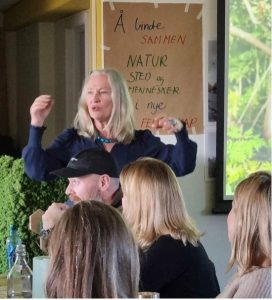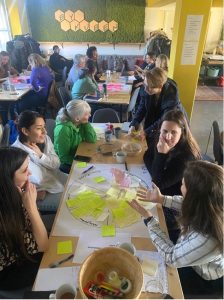”Why didn’t the gender perspective come into my mind – how could I forget?”
v/Kirsten Paaby, PS Paaby Prosess – EduAction, Norway

While being a partner in the Participatory Female Leadership-project I have also been working intensively with an action-research project here in Norway named ”Intermezzo – dialogic spaces in local planning processes”. In this project I work together with another woman, Mikaela Vasstrøm, assistant professor at the University of Agder. In the format of what we have called ”researching workshops” based on ”reversed participation” we explore how spaces of participation can be shaped between citizens and local authorities that is grounded on the citizens initiatives. In our ongoing research process we have found that citizen’s initiatives and local projects aiming at sustainability have the potential to establish and create new practices for social and ecological sustainability in their neighborhoods “on the edge” of the municipal planning system. During the project we have tested this model for “researching workshops” in Bergen, Kristiansand and Oslo, where we have been working closely with “ByKuben”, Center for Urban Ecology, Oslo Municipality. Each researching workshop is planned, developed and adapted to the specific context. In Bergen the researching workshop was connected with an ongoing municipal planning development process regarding the development of the center area in one of Bergen´s City Districts – and the municipality´s cooperation with the social entrepreneur “Fremtenkt” (“Forward-thinking”) and their “Laboratory for sustainable and democratic futures”. (https://futuresliteracynorway.blogspot.com/2020/11/fremtenkt-laboratory-for-sustainable.html ).
In Oslo we decided to arrange two thematically connected workshops. In the first one – that was arranged 3rd of March – the thematic framing was the question how citizens initiatives and social entrepreneurs can contribute to local sustainable development in Oslo. And we asked if the municipality is equipped to support and cooperate with such initiatives? We had five presentations under the headline: „To bind together nature, place and people in new communities“. The initiatives we heard about were all what we have characterised as social-ecological experiments and innovations caring for both nature and human beings.
The next workshop will be held 5th of April where we ”turn around the perspective” and focus on the theme and question: ”The municipal development role in the work for participation and sustainable neigborhoods. How can supporting and cooperating structures, networks and arenas be strenghened and developed in a way that this will sustain in a longer perspective?” (This with reference to the SDG 11 ”Sustainable Cities and Communities”.) We will hear case stories from different municipal projects and programs aiming at participation and sustainable neighborhoods.
The design of the ”researching workshops” as a way of working and model for co-creation is based on the following principles:
- To open the room for new and others perspectives
- Exemplaric learning
- Equal dialogue and active listening
- The unfinished –co-creating new horizons for the future
In the design of the workshops we build on many years of experience with future workshops and similar methods for democratic dialogues where innovative examples lays the ground for the dialogue and where scientific knowlegde supports the practical, experiential knowledge.
In designing the researching workshop the 3rd of March my colleague and friend Susan Morales Guerra was my mentor and gave advice based on her experience with the Art of Hosting methodology. Inspired by these advisory conversations the dialogue of the workshop became a customized version of „the Collective Storytelling Harvesting Methods“, which was of great success.

So now you may ask – how does all this connect to the gender issue, to the question regarding participatory female leadership?
Well…. The very same day when I was doing the last preparations and going through the final program, Susan Guerra and I had an online meeting in the ”Participatory Female Leadership project”-team and suddenly it struck me that those that were going to have presentations and those of us that are in the planning group are all women. I did not at all think of that before and was of course wondering why it became so? Is it a coincidence that all the five initiatives will be presented by and mostly are driven by women? And moreover is it a coincidence that we as planners and facilitators of the workshop are women? And looking over again the parcitipants list I could count 48 female participants among the 68 persons that had registered for the workshop. Reflecting more about the sudden discovery of this gender issue, Susan Guerra´s introduction at the webinar in December 2021 and her article ”A Quest for Learning- how can we identify Female Participatory Leadership” came into my mind and not the least the important questions she is raising:
- Is it women’s historic role as “gatherers” which makes our “femaleness” more likely to be participatory leaders?
- Is it more female than male to stand for values which support community and collective process in decision making?
- Do women, because they are women, prefer to practice a participatory leadership, respecting the authority of both the group and the individual? Is this possible or utopia?
I discussed my reflections and questions with my two colleagues in the planning group asking if we ourselves should make comments upon this when we opened the workshop. But we did not and wanted to wait and see: “Would anyone react and make comments?”
No one did so, except for one (female) participant writing in the evaluations sheet: “The group was too homogeneous. Powerful women who already knows a lot about the theme.” All the other comments addressed – mostly with a positive sign – the content, the presentations and not the least the process-design of the workshop, the possibility for networking and that the group of participants was a good mixture of employees from the municipality and representatives from local citizens´ initiatives and social entrepreneurs. So did we perform and demonstrate “participatory female leadership” – though in an – non-intentional – unbalanced way? Had it been only men presenting and only men in the group of facilitators I am quite sure that I and many with me would have raised their voices and pointed at the not gender-balanced program…..
One of the participants wrote in interesting blog after the first workshop. The very same day she joined a meeting in her local housing association. The reason for going to this meeting was to discuss the issue of how the board of the housing association without asking the members has shed several big trees. This was in order to save “the next trees” that might be shed and to inform the board about the importance of trees when it comes to the biodiversity in the area and with this also referring the policy of Oslo municipality to both save and not the least plant new trees.
For her joining the researching workshop and then in the evening the board meeting in the housing association became the experience of meeting two very different cultures and it made her reflect over the concept “listening dialogue”. The title of her blog was “About meeting a wall or an open door”. The meeting with the board of the housing association was like meeting “an impenetrable wall”, she became angry and frustrated and it gave her an experience of rejection and exclusion. Joining the researching workshop made her happy and inspired and she went back home with the feeling of community and inclusion. Closing her blog she sends a question to us in the planning group of the researching workshop: “How is it possible to transfer the methodology of the listening dialogue to boards of housing associations and public systems? How can we change the imbalance in power in settings like these?”
In our work forward I am sure we will dig more into the questions raised in this blog. And I hope to reflect and discuss further these issues when Susan Guerra and I hopefully will meet again with our wonderful (female) partners in the Participatory Female Project that as a pilot now has come to an end. There might be new beginnings…
References
Art of Hosting: https://artofhosting.org
Paaby Kirsten (2011): “The Future Scenario Workshop – learning for democracy” in SIGNALS, The Ideas Bank. http://eduaction.no/wp-content/uploads/2017/11/SIGNALS.pdf
Paaby Kirsten (2021): “The Future Workshop – a Democratic Way of Working with Imagination at the Centre” in “Climate Change – an Issue of Democracy and Relationshiops? https://cuegemer.sk/2021/11/11/studia-klimaticke-zmeny-problem-demokracie-a-vztahov/?fbclid=IwAR3dwAbldbXpvBmCPmUqCFmGD0xNoj-zY98wlGJnKG_NVAVlmliXNNtboeo
